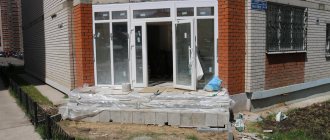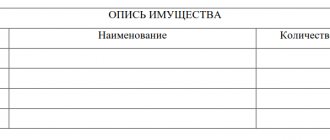The concept of reconstruction and (or) redevelopment of residential premises
In the Housing Code of the Russian Federation, compared with Art. 84 of the Housing Code of the RSFSR contains an entire chapter on the issue of redevelopment and (or) reconstruction. Issues of reconstruction and redevelopment of residential premises are established in Art. 25-29 Housing Code of the Russian Federation. Some cases of reconstruction and redevelopment of residential premises are defined in clause 1.7.1 of the Resolution of the Gosstroy of Russia dated September 27, 2003 No. 70 “On approval of the Rules and Standards for the Technical Operation of the Housing Stock.”
A number of technical issues related to redevelopment and reconstruction can be resolved at the level of constituent entities of the Russian Federation and municipalities. An example is the Moscow Government Resolution No. 508-PP dated October 25, 2011 “On the organization of reconstruction and (or) redevelopment of residential and non-residential premises in apartment buildings.”
The concept of reconstruction and redevelopment is enshrined in Art. 25 Housing Code of the Russian Federation.
So, the reconstruction of a residential premises is the installation, replacement or transfer of utility networks, sanitary, electrical or other equipment that requires changes to the technical passport of the residential premises.
Residential renovations may include:
- installation of new and rearrangement of existing gas appliances with the laying of additional supply networks;
- installation of household electric stoves instead of gas stoves or kitchen fires;
- replacement and (or) installation of additional equipment (engineering, technological) with an increase in energy, water consumption and (or) replacement of existing or laying additional supply networks (for non-residential premises).
Redevelopment of a residential premises is a change in the configuration of a residential premises, requiring changes to its technical passport. Redevelopment is carried out while maintaining the functional purpose of the premises.
Redevelopment of residential premises may include activities in which minor changes are made to the layout of the premises, including the integrity of the load-bearing walls of the residential premises is not affected: relocation, dismantling of interior partitions, installation of openings in interior partitions and new partitions without increasing the load on the floors, sealing of door openings in partitions and load-bearing walls, etc.
Also, the redevelopment of residential premises may include measures in which significant changes are made to the configuration of the residential premises, including affecting the load-bearing walls of the residential premises: arrangement (relocation) of restrooms and bathrooms; dismantling partitions, creating openings in partitions enclosing gasified premises; construction of load-bearing walls and openings in ceilings (when combined vertically) with the construction of internal stairs; installation or modification of floor structures carried out in order to repair (replace) existing ones; arrangement of openings in load-bearing walls and inter-apartment partitions; sealing unauthorized openings in load-bearing walls and ceilings; construction and installation work for the manufacture of floors and (or) changes in the design of floors; combining loggias with interior spaces; dismantling (full, partial) of non-load-bearing partitions that accept additional excess load of floors (unloading), etc.
It is possible to carry out a number of works without completing design and permitting documentation:
- cosmetic repairs of premises, including replacement of external carpentry elements without changing the design and color;
- arrangement (disassembly) of built-in furniture: cabinets, mezzanines (not forming independent premises, the area of which is subject to technical accounting);
- replacement (without rearrangement) of engineering equipment with similar parameters and technical design.
Also related to the reconstruction and (or) redevelopment of residential premises in apartment buildings are works, the production of which is associated with the transfer for use of part of the common property and (or) affects the architectural appearance of the apartment building:
- creating entrances, changing entrances and vestibules with the construction of porches (stairs to basements and basements), which does not involve the addition of an additional plot of land;
- creation, elimination, changing the shape of window and door openings in external enclosing structures (walls, roofs);
- creation of entrances (stairs, porches and other areas) to basement or basement premises or to the first floors of buildings within the dimensions of the land plot belonging to the common property of the owners of premises in an apartment building;
- installation of external technical means on the façade that ensure unhindered movement of people with limited mobility: push-out telescopic elevators, double-row handrails, etc., stairs outside the external walls of the building;
- installation of loggias and terraces on the first floors, etc.
Reconstruction and redevelopment are not allowed in which:
- the strength of the building is compromised or the load-bearing structures are destroyed;
- the operation of engineering systems and (or) equipment installed on it is disrupted;
- the safety and appearance of facades deteriorates;
- fire safety devices are broken;
- the operating conditions of the house and the living conditions of all or individual citizens of the house or apartment are deteriorating, etc.
According to Part 1 of Art. 26 of the Housing Code of the Russian Federation, reconstruction and (or) redevelopment of residential premises are carried out in agreement with the local government body on the basis of a decision made by it.
Types of room configuration changes
Changing the configuration of a residential or non-residential premises is its redevelopment, and if there is an impact on engineering structures, then this is defined by law as a redevelopment. Accordingly, such actions need to be legalized.
Redevelopment can include changes in the structure such as glazing balconies or changing the area of a room by moving walls that are not permanent.
If reconstruction is carried out, the owners can change sanitary equipment, utility networks, and electrical equipment.
Any major change to internal structures requires prior approval. Upon completion of the work, the owner will need to receive a document indicating the changes made. You can change furniture or equipment for similar ones or do routine repairs in any room without any approval.
Documents submitted for approval of reconstruction and (or) redevelopment of residential premises
To carry out the reconstruction and redevelopment of residential premises, the owner of this premises or a person authorized by him submits to the approval body at the location of the residential premises being rebuilt and (or) redeveloped directly or through a multifunctional center:
1) application for reconstruction and (or) redevelopment. The form of such an application was approved by Decree of the Government of the Russian Federation dated April 28, 2005 No. 266 “On approval of the application form for the reconstruction and (or) redevelopment of residential premises and the form of the document confirming the decision to approve the reconstruction and (or) redevelopment of residential premises”1. The application must set out the goals of the upcoming work, specific types of reconstruction and redevelopment, the legal form of the contractor, as well as the start and completion dates of the work;
2) title documents for residential premises in originals or notarized copies. These are contracts for the transfer of ownership of premises, contracts of purchase and sale, donations, a certificate of inheritance rights to the premises (together with a certificate of state registration of ownership), etc.;
3) a project for the reconstruction and (or) redevelopment of the residential premises being rebuilt and (or) redesigned in accordance with the established procedure. If only activities (work) are envisaged for which sketches are sufficient, then they are carried out on copies of floor plans. If the planned activities (works) require the development and approval of projects, then they must be developed by design organizations that are members of the relevant self-regulatory organizations;
4) technical passport of the residential premises;
5) consent in writing of all members of the tenant’s family (including those temporarily absent) occupying the rebuilt and (or) replanned residential premises on the basis of a social tenancy agreement (if the applicant is a tenant of the rebuilt and (or) replanned residential premises authorized by the landlord under a social tenancy agreement). If the applicant is the owner of the residential premises, the consent of family members is not required. If the residential premises are in common ownership, the consent of all co-owners is required;
6) when the residential premises or the house in which it is located is an architectural, historical or cultural monument, a conclusion from the body for the protection of architectural, historical and cultural monuments is required on the admissibility of reconstruction and (or) redevelopment of the residential premises.
This list of documents is exhaustive, and in accordance with Part 3 of Art. 26 of the Housing Code of the Russian Federation, the body carrying out the approval of reconstruction and redevelopment does not have the right to require other documents.
Moreover, according to clause 2.1 of Art. 26 of the Housing Code of the Russian Federation, the applicant has the right not to submit a technical passport of the residential premises and the conclusion of the body for the protection of architectural, historical and cultural monuments, as well as title documents for the residential premises, if the ownership of it is registered in the Unified State Register of Rights to Real Estate and Transactions with It. The body carrying out the approval requests the specified documents (their copies or the information contained in them), if they were not submitted by the applicant on their own initiative, to the relevant state bodies, local government bodies and organizations subordinate to state bodies or local government bodies. Bodies and organizations that have such documents at their disposal are obliged to send to the body carrying out the approval the requested documents (their copies or the information contained in them) on paper, in the form of an electronic document or in the form of copies of the requested documents certified by an authorized person, including number in the form of an electronic document.
When the reconstruction and (or) redevelopment of premises is impossible without adding to them part of the common property in an apartment building, for such reconstruction, redevelopment and (or)
redevelopment of premises must obtain the consent of all owners of premises in an apartment building (Article 40 of the Housing Code of the Russian Federation).
Changing the size of common property in a communal apartment is possible only with the consent of all owners of rooms in this apartment through its reconstruction and (or) redevelopment (Article 41 of the Housing Code of the Russian Federation).
On acceptance of documents, the applicant is given a receipt for receipt of documents indicating their list and the date of their receipt by the body carrying out the approval. In case of submission of documents through a multifunctional center, a receipt is issued by the specified multifunctional center.
What is regulated
The entire redevelopment process is enshrined in law.
The main document regulating these issues is the Housing Code of the Russian Federation.
Chapter 4 fully addresses all issues related to this type of work.
Other documents that are relied upon when carrying out redevelopment are:
- Rules for technical operation of housing stock (sections 4, 5);
- Decree of the Moscow Government No. 508-PP (as amended No. 840-PP) clause 2 of Appendix 1;
- SanPiN requirements;
- SNiP requirements.
The procedure for approving the reconstruction and (or) redevelopment of residential premises
The decision to approve or refuse to approve redevelopment or reconstruction must be made based on the results of consideration of the relevant application and other submitted documents no later than 45 days from the date of submission of the documents, the obligation to submit which is assigned to the applicant. If documents are submitted through a multifunctional center, then the period for making a decision on approval or refusal of approval is calculated from the day the multifunctional center transfers such documents to the body carrying out the approval.
The body carrying out the approval, no later than 3 working days from the date of the decision on approval, issues or sends to the address specified in the application a document confirming the adoption of such a decision (see Decree of the Government of the Russian Federation dated April 28, 2005 No. 266 “On approval of the form application for reconstruction and (or) redevelopment of residential premises and the form of a document confirming the decision to approve the reconstruction and (or) redevelopment of residential premises." If an application for reconstruction and (or) redevelopment was submitted through a multifunctional center, then a document confirming the decision is sent to the multifunctional center, unless another method of receiving it is specified by the applicant.
A document confirming the decision to approve the reconstruction and (or) redevelopment of residential premises is the basis for the reconstruction and (or) redevelopment of residential premises.
Next, reconstruction and (or) redevelopment work is carried out.
The commencement of permitted work on the reconstruction of premises in a residential building is subject to registration by the organization managing the apartment building in a journal in the form established by the body carrying out the approval of the reconstruction and (or) redevelopment.
At the same time, the completion date of the work, the procedure and conditions for the removal of construction waste are established. The organization managing the apartment building reports the fact of the start of work to the body that coordinates the reconstruction and (or) redevelopment, which is entrusted with monitoring the progress of work.
Based on Art. 28 of the Housing Code of the Russian Federation, the completion of the reconstruction and (or) redevelopment of the residential premises is confirmed by an act of the acceptance committee. Such an act of the acceptance committee is sent by the body carrying out the approval to the body or organization that carries out state registration of real estate objects in accordance with the Federal Law of July 24, 2007 No. 221-FZ “On the State Real Estate Cadastre”. By such a body, in accordance with Art. 3 of this law is a federal executive body authorized in the field of state registration of rights to real estate and transactions with it, cadastral registration and maintenance of the state real estate cadastre. This is the Federal Service for State Registration, Cadastre and Cartography (Rosreestr).
What documents are needed
When submitting an application to the Housing Inspectorate, you must attach a package of documents:
- document on ownership of the redevelopment object;
- an extract from the house register about those registered in this premises;
- consent to redevelopment from all adults registered in this living space;
- redevelopment project (sketch);
- technical passport from BTI.
Refusal to approve the reconstruction and (or) redevelopment of residential premises
Article 27 of the Housing Code of the Russian Federation provides for the grounds for refusal to approve the reconstruction and (or) redevelopment of residential premises: failure to submit documents and submission of documents to an inappropriate body.
1) failure to submit documents necessary for approval of redevelopment and (or) reconstruction, the obligation to submit which is assigned to the applicant;
2) receipt by the body carrying out the transfer of premises of a response from a state authority, local government body or an organization subordinate to a state authority or local government body to an interdepartmental request, indicating the absence of a document and (or) information necessary for approval of the redevelopment and (or) reconstruction, if such a document is not submitted by the applicant on his own initiative. Refusal to approve the redevelopment and (or) reconstruction of the premises on the specified basis is permitted if the body carrying out the approval of the redevelopment and (or) reconstruction of the premises, after receiving the specified response, notified the applicant about the receipt of such a response, invited the applicant to submit a document and (or) information necessary for approval of redevelopment and (or) reconstruction, and did not receive such a document and (or) information from the applicant within fifteen working days from the date of sending the notification;
3) submission of documents to the wrong authority.
4) non-compliance of the project for reconstruction and (or) redevelopment of residential premises with the established requirements.
The decision to refuse approval for the reconstruction and (or) redevelopment of residential premises must contain the grounds for refusal with a mandatory reference to the violations provided for in Part 1 of Art. 27 Housing Code of the Russian Federation. The decision is issued or sent to the applicant no later than 3 business days from the date of its adoption and can be appealed by the applicant to the court (in accordance with Chapter 25 of the Code of Civil Procedure of the Russian Federation).
Where to go
To obtain permission for redevelopment or to coordinate it, you need to contact the Housing Inspectorate or the Capital Construction Department of the administration of your locality.
These bodies can also provide preliminary consultation on all issues related to the planned redevelopment.
You can also get it:
- from lawyers dealing with housing law issues;
- from employees of design organizations.
Due to the nature of their activities, they are required to know the law and will give you practical advice.
You will also have to deal with the BTI. The Bureau issues you technical documentation for the residential premises, which you then submit (to the design organization or the Housing Inspectorate).
If a project is required to carry out the redevelopment, you need to order it from the design organization.
Make sure she has an unexpired SRO permit. This is very important for further approval of the project completed by her.
What cannot be legalized
But there are also changes that cannot be legitimized.
Accordingly, a project based on them cannot be drawn up, and permission cannot be obtained.
Such actions include:
- redevelopment that worsens the living conditions of all residents or infringes on the interests of some;
- changes that violate the stability of load-bearing structures;
- leading to deterioration of the appearance of the facade;
- changes in the configuration of utility networks that disrupt their functioning.
These actions are dangerous for the stability of the entire building, shorten its service life, and pose a risk to the life and health of people living here.
What is a standard project
Standard designs were developed by the State Unitary Enterprise MNIITEP.
This need arose due to frequent requests from residents of standard multi-storey buildings for the redevelopment of their apartments.
These buildings were built in the 50-80s of the last century with the aim of providing housing for Soviet families. Then the priority was not the convenience of living, but the number of families provided with housing. It is not surprising that at the beginning of this century, design organizations and the Moscow Housing Inspectorate were inundated with applications for redevelopment.
State Unitary Enterprise MNIITEP has developed projects based on the most common types of redevelopment.
They are simple, but make living in an apartment more convenient. All projects have already been agreed upon with the Moscow Housing Inspectorate.
Therefore, if the standard project suits you, then this part of the work can be considered completely completed.
In your application to the Housing Inspectorate, you indicate only the project number from the catalog (there are about 130 of them) and receive permission.
Registration cost
The cost of remodeling depends not only on the area of the room. It is influenced by the need to complete the project, the involvement of intermediary companies in the design, and the technical complexity of the planned work.
Prices (in rubles) for different types of redevelopment work are given in the table:
| Service | Price |
| Preliminary consultation | 1,000-2,000 (free at the Housing Inspectorate) |
| Project implementation | from 15 000 |
| Technical conclusion | 10 000-15 000 |
| BTI passport | 2,000-5,000 (with duty) |
| Permission from the Housing Inspectorate | for free |
| Services of intermediary companies | 3,000-5,000 for each service |
Redevelopment can be both simple and technically complex.
Each variety has its own coordination features, which it is advisable to familiarize yourself with in advance.






